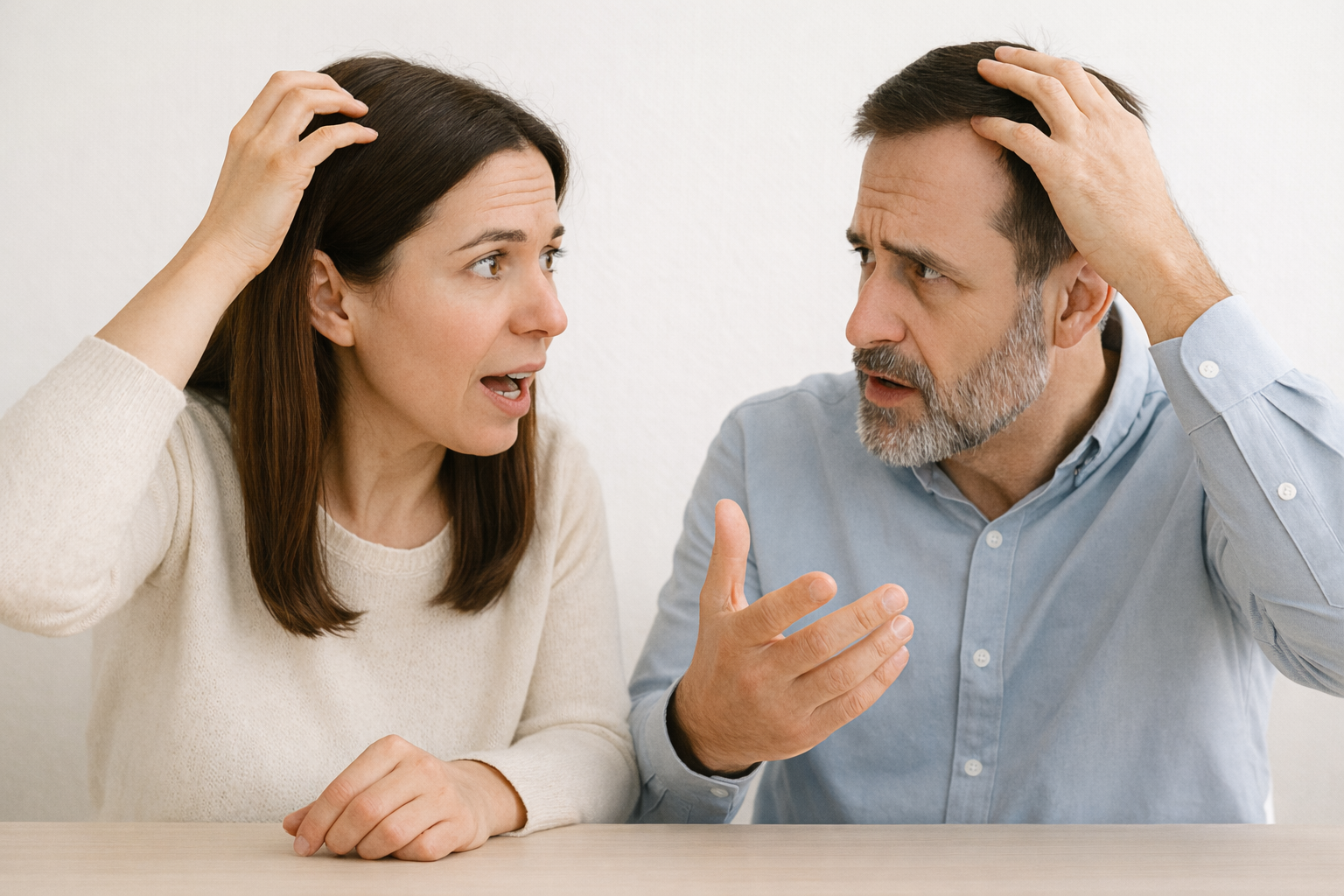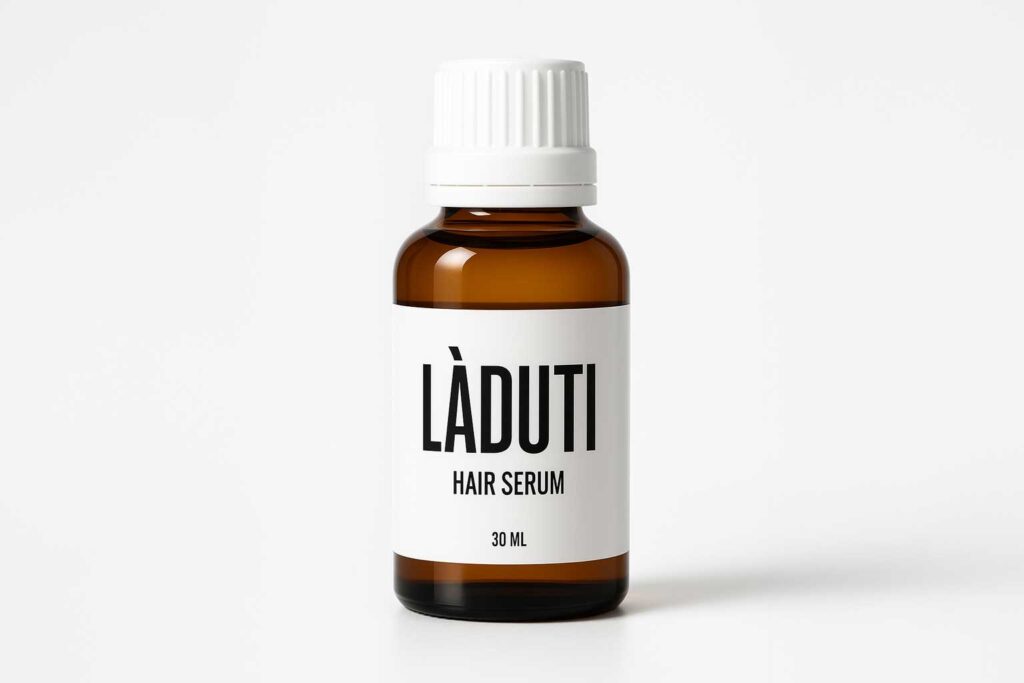Hair loss from stress – We explain the causes and give you effective everyday tips

Many people are familiar with it: constant stress, pressure at work or private worries not only affect our mental well-being, but also our external appearance. Suddenly there is an increase in hair in the brush, in the drain or on the pillow. The question is obvious: can stress actually cause hair loss? Should hair loss caused by stress be taken seriously?
The answer is yes - and the mechanisms behind it are well researched.
1. Hair Loss Due to Stress: The Main Causes
How stress affects the body
Cortisol and hormone balance
Under stress, the body releases more of the stress hormone cortisol. This upsets the hormonal balance and can disrupt the hair cycle.
- The growth phase (anagen phase) in particular is shortened.
- Hair falls out earlier and grows back more slowly.
Inflammation & blood circulation
Impaired nutrient supply
Stress promotes inflammatory processes in the scalp and impairs blood circulation to the hair follicles.
- The hair roots are less well supplied with oxygen and nutrients.
- Over time, the hair grows back weaker and finer.
Oxidative stress
Free radicals
Chronic stress increases the formation of free radicals that attack cells. The sensitive hair follicles are also affected.
- Consequence: hair becomes thinner
- The risk of diffuse hair loss increases in the long term
2. What Really Helps with Hair Loss Caused by Stress
Stress management as a basis
Relaxation & balance
The most important foundation is to reduce stress levels:
- Regular exercise (walks, sports such as jogging, cycling, swimming)
- Relaxation techniques such as yoga, meditation or breathing exercises
- Healthy sleep - at least 7-8 hours per night
- Social contacts & hobbies: balance in everyday life creates inner balance
Tip: Even small routines such as a daily walk or 10 minutes of breathing exercises can noticeably reduce stress levels.
Nutrition for strong hair
Nutrient-rich food for hair loss due to stress
A balanced diet supports the regeneration of the hair roots. This is particularly important:
- Biotin → supports keratin formation (e.g. in nuts, eggs, oatmeal)
- Zinc → important for cell division (e.g. in pulses, pumpkin seeds)
- Omega-3 fatty acids → have an anti-inflammatory effect (e.g. linseed oil, chia seeds, algae oil)
- Vitamins A, C and E → protect the cells from free radicals
Note: Anyone who suspects a nutrient deficiency should have a blood test carried out by a doctor before taking supplements.
Scalp care & hair serums
Creating a healthy basis for hair loss due to stress
A healthy scalp is the basis for strong hair. Care products with natural active ingredients can:
- stimulate blood circulation (e.g. caffeine, rosemary oil)
- soothe the hair roots
- support the regeneration of the follicles
Tip: Regular scalp massages (5-10 minutes daily) improve microcirculation and increase the effectiveness of hair serums.
3. Hair Loss Due to Stress: Further Tips & Information
Have patience
Hair reacts to changes with a time delay. Even if therapy or a change in lifestyle takes effect, the first improvements usually only become apparent after 3-6 months. It is therefore important to keep at it and observe hair growth over a longer period of time.
Reduce caffeine in everyday life
High coffee consumption can also drive up cortisol levels and thus increase stress in the body. This in turn has a negative effect on hair metabolism.
Better alternatives
- Herbal teas (e.g. camomile, lemon balm, rooibos)
- Green tea in moderation (antioxidant, but lower in caffeine)
- Water with lemon or ginger
Digital detox in the evening
The blue light from smartphones and screens inhibits the production of melatonin - the hormone that ensures restful sleep. Poor sleep also means greater stress for the body and can increase hair loss.
Practical tips
- Reduce screen time in the evening
- Activate blue light filter or use special glasses
- Switch off devices at least 1 hour before going to bed
Sufficient hydration
The body - and therefore also the hair - consists to a large extent of water. A lack of fluids can therefore have a direct impact on hair quality and scalp health.
Recommendation
- Drink 1.5-2 liters of water daily (depending on body size and activity)
- Drink water throughout the day, not just in large quantities at once
- Ensure increased fluid intake during sport or in the heat
Conclusion: Counteract stress in a targeted manner and support the body
Stress is an underestimated factor in hair loss - but it can be actively influenced. With stress management, a balanced diet and targeted scalp care, you can bring your hair roots back into balance.
Of particular interest are herbal active ingredients that stabilize the hair cycle and soothe and vitalize the scalp. Our Laduti Hair Growth Serum addresses this very issue: It combines natural ingredients such as biotin, caffeine, herbal extracts, and vitamins, which can have a synergistic effect without harsh chemicals. This provides gentle but effective support for anyone who wants to strengthen their hair in stressful times.

FAQ
Can stress alone cause hair loss?
Yes, severe or chronic stress can disrupt the hair cycle and lead to increased hair loss. However, nutrition, hormones or genetic factors often also play a role.
How long does hair loss due to stress last?
In many cases, hair growth normalizes as soon as the stress phase is over. However, it can take several months for the hair to grow back.
Does it help to take nutritional supplements for hair loss caused by stress?
Micronutrients such as zinc, biotin or omega-3 can have a supportive effect. However, they should be seen as a supplement to a healthy diet and stress reduction.
Can stress-related hair loss be stopped permanently?
It can only be stopped permanently if the cause of the stress is recognized and reduced. Serums and scalp care can help to strengthen the hair roots.
What measures reduce hair loss caused by stress most effectively?
Relaxation techniques such as meditation, yoga or breathing exercises help to reduce stress levels. In addition, sufficient sleep, exercise and a balanced diet can support hair growth.

